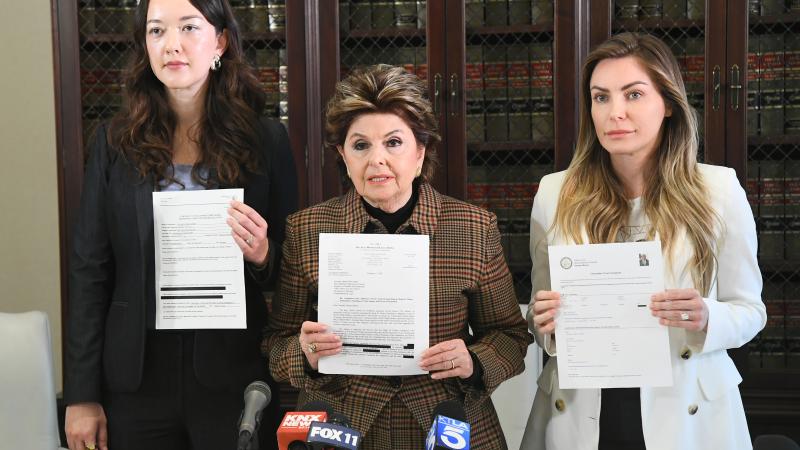Bias obscures 'excessive force' in Jan. 6 shooting death of Ashli Babbit, says family's lawyer
"If this case happened out in Minneapolis or some other place, and it wasn't politically charged," most would see "an obvious case of excessive force," said attorney for slain vet's husband.
Only one person was shot and killed during the Jan. 6 Capitol riot: unarmed protester and Air Force veteran Ashli Babbitt, at the hands of a Capitol Police officer. Prosecutors announced they will not charge the officer, an African-American lieutenant on the force who has not been publicly identified.
Sinclair's Sunday TV Program, "Full Measure with Sharyl Attkisson," investigated the murky story of the fatal shooting in an interview with attorney Terrell Roberts, who represents Babbitt's husband, Aaron.
"She's not brandishing a weapon," said Roberts, analyzing the video showing Babbitt being shot by the Capitol Police officer. "So he's shooting an unarmed individual who is not assaulting him or threatening him. If this case happened out in Minneapolis or some other place, and it wasn't politically charged, I think that most people would see this as an obvious case of excessive force."
Roberts discussed portions of the video.
"Ashli Babbitt is a part of that crowd," Roberts said. "Then you can see some individuals, they do get physical. They start to hit the door, break some of the windows. There are three officers present at that point ... And they move out of the way."
Roberts was asked why the police and SWAT team didn't protect the door to the Speaker's Lobby. "That's exactly what we're going to try to find out, why that was," he replied. "We'll find out. But it's clear that's what they're doing, they're actually abandoning the door ..."
"At the time that this officer shoots, there's no member of Congress in that lobby," he noted. "So I think all this adds up to a situation where the officer did not need to shoot and kill the lady."
Roberts said he plans to bring a suit arguing the officer violated the constitutional rights of Babbitt.
While "the officer's attorney says he clearly identified himself before shooting, and ordered the mob not to come through the window," reports Attkisson, "Roberts says there’s no sign of that on the video."
Jason Johnson, a former Baltimore deputy police commissioner who heads up the Law Enforcement Legal Defense Fund, defends the police officer's actions as a reasonable response to a perceived deadly threat.
"I think because of the information that he likely has at that point about what is happening in other parts of the Capitol complex with officers being assaulted, subjected to chemical agents, beaten," Johnson said, "the fact that many people are armed and that they are after certain members of Congress, that that officer felt in that moment, that if that entry is breached by that group of people, likely several of whom were armed, that that would present a deadly threat to either himself, members of Congress, other Capitol police officers, other members of congressional staff, and therefore believed that he was acting reasonably to use deadly force."
Investigators shared Johnson's assessment, concluding there was no evidence that the anonymous officer did not reasonably believe it was necessary to fire on Babbitt "in self-defense or in defense of the Members of Congress and others evacuating the House Chamber."
"We've interviewed several witnesses on the same side of the door with Ashli Babbitt," Roberts said. "They didn't hear any kind of warning. I think a reasonable officer would know, given the noise on the other side of the door, that anything that he's saying would not be heard. In fact, if you watch the video carefully, there's an officer in a suit that strolls across the hallway at the time that he is supposedly yelling an announcement, who doesn't even seem to react to that. So those are three important factors why we think he didn't give an announcement."
The name of the officer is being kept hidden, which could reflect the fact that the Capitol Police force is under the authority of Congress and, like Congress, is exempt from Freedom of Information Act requests. Their officers also don't wear body cameras.
Regarding the potential racial aspect of the shooting, given that Babbitt was white and the officer is African-American, Roberts said: "The problem with the case is that the case must be looked at independent of the politics, independent of the racial information in the case. The unfortunate part, though, is that people take it into account ... However, when the case gets into a courtroom, there's no racial litmus test that's used. So if people would just put that to the side and look at the case fairly, I believe they're going to ... follow the law, apply the law fairly, and reach a just result."
In a statement, the officer's attorney insisted his client's "bravery was nothing short of heroic and by shooting and killing Babbitt, he saved the lives of countless members of Congress and the rioters. The nation owes him a debt of gratitude."















